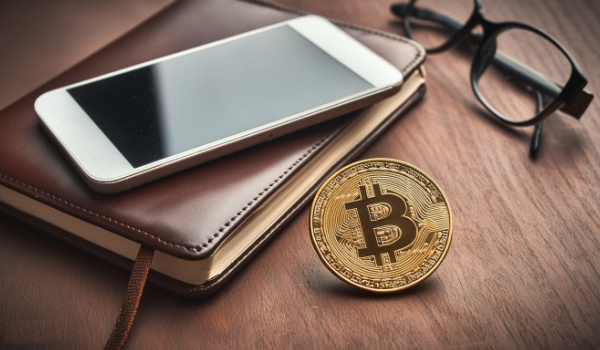Despite fraudulent activities, everything continued to buzz with expanded institutional adoption. That said, the lack of regulatory clarity kept showing up with incoming legislation that could provide a way out if partisan politics allows its passing.
The headlines:
- Swift revealed its pro-crypto plans;
- Ramp Network is all over America and is playing by the rules;
- Coinbase one-upped Justin Sun and the wBTC crew with an alternative ;
- Grayscale made crypto (and American) history with an XRP Trust;
- Plus, the Lazarus Group got hit by stablecoin issuers who have their internal problems (read on to find out);
- And much more!
As always, these are your decentralized diaries!
Bitcoin is at $58k
From a $54,848.60 low, Bitcoin climbed to a $59,947.96 high to settle at $58,254.24 (as of 9/16/24). The altcoins are moving similarly.
Ethereum (ETH) is at $2,267.51, Solana (SOL) is at $129.39, Avalanche (AVAX) is at $23.36, Chainlink (LINK) at $10.54 and Polkadot (DOT) at $4.25.
Swift Made a Big Announcement
The adoption conversation took a new turn with a revelation from the global messaging network Swift. In a September 11 post on its website, the financial communications platform revealed plans to support digital assets and (regulated) crypto tokens.
Additionally, Swift touted a rise in tokenization, CBDC, and stablecoin development activities as reasons for the move.
Ramp Network Revealed Further Expansion Across America
Premier crypto infrastructure firm Ramp Network expanded its footprint across the United States. Ramp added 17 states to its coverage and is (now) available in all 50 states.
Besides simplifying access to crypto assets, Ramp will ensure compliance with local laws. Services to users will vary by state and according to regulations.
Wrapped Bitcoin Has a Competitor
Coinbase continued to make waves. This time, the “cbBTC,” its competitor to the “wBTC,” has become (wildly) popular since its September 12 debut.
The crypto exchange introduced the token on the Base and Ethereum blockchains following controversy around the wrapped Bitcoin token (wBTC). cbBTC’s market capitalization is currently at $100,616,726 (on 9/16/24).
Microstrategy Made a Whale Purchase
Software firm Microstrategy made a big splash with an 18,300 Bitcoin acquisition worth (approximately) $1.1 Billion. According to an X/Twitter post by Microstrategy CEO Michael Saylor, this is its most significant buy since 2021.
The ARK 21Shares ETF Added New Custodians
Boutique crypto ETP issuer 21Shares revealed the expansion of custodians for its “ARK21 Shares” spot products. BitGo and Anchorage Digital joined Coinbase.
The product suite includes the 21Shares Core Ethereum ETF, CETH, the ARK 21Shares Bitcoin ETF, ARKB, and other offerings.
OpenSea and its Supporters Launched a Defense Fund
Following receiving a Wells Notice and the SEC’s intent to sue, NFT marketplace OpenSea unveiled a defense fund alongside several allies, including “Stand With Crypto,” an industry support initiative, and premier VC Andreessen Horowitz (a16z). The parties seeded the “Creator Legal Defense Fund” with $6 million in funding and aimed to protect and defend creators and artists from legal issues with regulators.
OpenSea made a $5 million pledge, while Horowitz contributed $1 million.
Some Settlements Occurred
The week was (also) busy with settlement activities taking place. Without the admission of guilt, GSB chairman Josip Heit agreed to return crypto and fiat deposits to depositors in five states. GSB and its related entities settled with regulators across five states, including Texas, Alabama, Georgia, and Arkansas.
Similarly, the famous trading firm eToro agreed to pay a $1.5 million fine as part of a settlement with the SEC. Consequently, eToro restricted American customers from trading tokens (only Bitcoin, Ethereum, and Bitcoin Cash are tradeable).
Grayscale Introduced America’s First XRP Trust
Crypto asset management behemoth Grayscale Investments® has made history with the launch of the United States’ first XRP Trust. The “Grayscale® XRP Trust” is available to (eligible) individuals and (accredited) institutional investors.
Moreover, the product provides (direct) exposure to Ripple token. The offering is similar to Grayscale’s other single-asset vehicles.
The SEC Reversed Course on SAB 121
Following the earlier drama surrounding the SAB 121 reporting rules, the SEC appears to have (reportedly) provided certain “exemptions” to the rule. According to a September 9 speech by SEC Chief Accountant Paul Munter, critical players, including bank holding companies, could “sidestep” the requirements if they follow several (outlined) steps.
They include state regulatory approval, remote custody protections, external legal advice, contractual negotiations, and adequate risk assessments.
There’s a New Crypto Bill on Capitol Hill
A bill seeking to harmonize regulatory actions on the House of Representatives floor could be (a sign) of things to come. Rep. John Rose (R-TN 6th District) introduced the “BRIDGE Digital Assets Act.” The legislation intends to establish a joint committee comprised of the CFTC and the SEC to oversee the crypto industry.
Furthermore, the (proposed) Joint Advisory Committee will include at least 20 private sector participants on an advisory basis to make recommendations.
Tether and Circle Banned Lazarus Group-Linked Wallets Holding $4.96 Million
Infamous North Korean hacking posse Lazarus Group lost access to several wallets containing $4.96 million in digital assets, including USDT, USDC, BUSD, and TUSD tokens. Stablecoin issuers Tether and Circle attempted severally to have the wallets blacklisted alongside industry key players, including Techteryx and Paxos.
Moreover, several exchanges attempted to block access to an additional $1.65 million in crypto tokens.
In related news, advocacy nonprofit Consumers’ Research queried the lack of an independent audit for stablecoin issuer Tether. An open letter to the 50 state governors (and on a website) from Consumers’ Research identified several issues, including the nearly ten-year lack of an independent assessment of the firm’s reserves.
Furthermore, the advocacy watchdog accused Tether of aiding bad actors in going around sanctions, despite Tether’s claims to the contrary and assurances that its reserves (really) exist.





